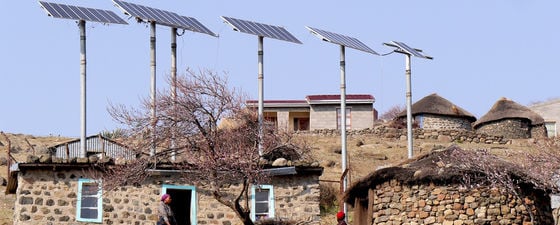While oil will continue to have a role in Africa for the foreseeable future, both in production and consumption, natural gas can and should have a bright future as part of Africa’s cleaner energy mix.
The latest Africa Outlook report by the International Energy Agency shows population growth in Africa dramatically outstripping other parts of the world. © Tino MAger/Dreamstime.com.
America sneezes and the rest of the world catches a cold. An old saying but what about this for a new one: China coughs and the world gets a virus. For the moment at least – certainly at the time of writing (4th Feb 2020) – coronavirus looks like it could have a significant impact on global trade and at the same time put more downward pressure on the oil price. OPEC is due to meet and even Russia is prepared to join talks with a view to curtailing production.
China consumes about 14 MMb of crude a day; getting close to US consumption in a global market predicted to top 100 MMbopd in 2020. This figure could dip sharply if coronavirus keeps China in shutdown mode – and in the meantime fewer container ship voyages, less air travel and a manufacturing hiatus in China might well be seen as good news by the green lobby.
But is it? The global economy arguably needs growth like never before. The latest Africa Outlook report by the International Energy Agency shows population growth in Africa dramatically outstripping other parts of the world. It notes: “Rapid economic and population growth in Africa, particularly in the continent’s burgeoning cities, will have profound implications for the energy sector, both regionally and globally.” In other words the developing world needs energy, the cleaner the better, from all sources.
Africa we know is rich in potential for solar power but development is piecemeal. In South Africa, for example, Eskom, the government-owned national power utility, gives consumers no incentive to install domestic solar while continuing with regular power outages. While oil will continue to have a role in Africa for the foreseeable future – both in production and consumption – natural gas can and should have a bright future as part of the region’s cleaner energy mix, according to Dr Fatih Birol, Executive Director of the International Energy Agency.
“Africa has a unique opportunity to pursue a much less carbon-intensive development path than many other parts of the world,” notes Dr Birol, adding that natural gas and greater energy efficiency have to be part of the mix, alongside the growth in renewable energy. Poor maintenance over a long period has undoubtedly contributed to what Eskom terms‘load shedding’ and it is the consumer who suffers, not only with power cuts but also higher bills. When China stops coughing Africa will continue to be a prime target across the spectrum of energy investment.
GEO ExPro’s FlowBack Column
More articles from the FlowBack column series written by industry journalist Nick Cottam.
Gas with a Difference
Nick Cottam
There are no simple solutions to transforming the world’s energy systems.
This article appeared in Vol. 16, No. 6 – 2019
The Carbon Capture Conundrum
Nick Cottam
Carbon Capture Utilisation and Storage will continue to need a kick-start, from the chilly depths of the North Sea to the heat of Texas. Ultimately capturing carbon will have to be cheaper than not capturing it.
This article appeared in Vol. 16, No. 5 – 2019
The Value of Satellite Data in the Oil and Gas Sector
Nick Cottam
Are satellites creating a more level playing field in the oil and gas sector?
This article appeared in Vol. 16, No. 4 – 2019
The Generation Z Factor
Nick Cottam
How can we attract the next generation into the oil and gas industry?
This article appeared in Vol. 16, No. 3 – 2019
A Balancing Act
Nick Cottam
Oil and gas majors must hedge their bets if they are to ride the energy transition conundrum.
This article appeared in Vol. 16, No. 2 – 2019





